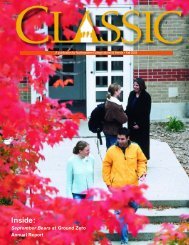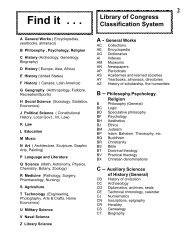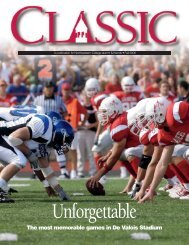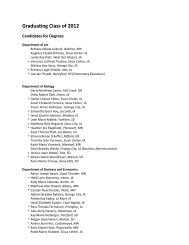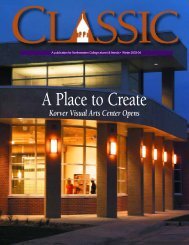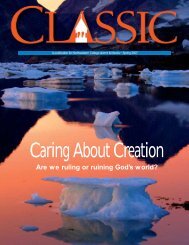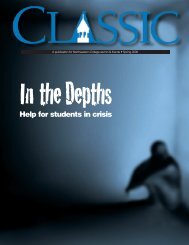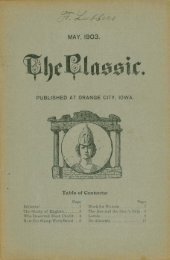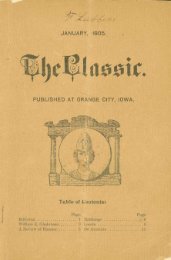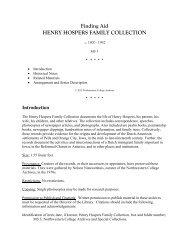Summer 2010 - Northwestern College
Summer 2010 - Northwestern College
Summer 2010 - Northwestern College
- No tags were found...
Create successful ePaper yourself
Turn your PDF publications into a flip-book with our unique Google optimized e-Paper software.
Classic: What will?Classic: You’re a U2 fanboy.Keuss: The truth. The search for truth is ongoing, and ChristiansKeuss: After becoming a Christian in high school, I was in aare not the only ones or sometimes even the best ones atChristian music store—and among albums by Keith Green andrecognizing the truth. Sometimes people we think of as pagansRandy Stonehill, I found U2’s War. I bought it, listened and wasare creating the best art, doing the best research, asking the besttelling my friends about this cool Christian band, and my friendsquestions and seeing in ways that open our eyes.said, “They’re not Christians.” I thought, “What?!” Their music, like“40” about Psalm 40, reached me in ways music by Christian artistsinto the culture they live in instead of forbidding them from readingClassic: What hinders Christians’ search for truth?hadn’t. So I bought more albums.something or insisting they read only books from a Christianbookstore.Keuss: Some Christians are confined byClassic: Bono and his band are rockwhat psychologist Dr. Tim Clydesdalestars, though. Some Christians areAn interview with Jeffrey Keuss, Ph.D.A Christian college professor and pastor, Jeff Keuss has beencalled “an engaging interpreter of theology in popular culture”by colleagues at The Kindlings (www.thekindlings.com). Keuss’work with youth and his research on Christ and culture has led toscholarship on subjects like Dr. Seuss, Bruce Springsteen, StarWars, Twilight and U2. During his visit to <strong>Northwestern</strong> for thecollege’s third annual Day of Learning in Community, Classicstaff asked him about Christianity and pop culture.Classic: I understand you’ve read Twilight.Keuss: I have. Three of Stephenie Meyer’s books are in myoffice at Seattle Pacific University, which both shocks and awesstudents. They ask, “How can you read that?” And I ask, “Howcan I be conversant with culture if I don’t know what’s happeningin culture?” The questions Twilight raises—about love, intimacy,growing up, life after death—these aren’t just Christian questions.Classic: OK. But would you let your daughters read Twilight?Keuss: My oldest is 9, and she asked but then she got interested inPercy Jackson. When she picks up Twilight, we’ll read it together. Idon’t believe in shielding her from the world, but I’d also never sendher out there alone. As a parent, I need to nurture my daughtersClassic: Something wrong with the books in a Christian bookstore?Keuss: Probably not. But books, music and movies created fora Christian subculture aren’t always representative of the realworld, which means they’re not really telling the truth. I don’t seeanywhere in Scripture where the church is called to create its ownculture apart from the world. Yes, we’re to be in the world and notof it, but we’re not to create our own Christian subculture thatsecludes us. The problem with Christian subcultures is that oneof the implications is “Be afraid.” I don’t think it’s helpful to instillchildren with a fear of the world, so they’re terrified—and unable tothink clearly—when they inevitably encounter it.Classic: As parents—or educators or pastors—how do we helpprepare young people to engage popular culture?Keuss: We need to help them develop open hearts and criticalminds. I think I do my children—or my students—a disservice if I tryto protect them from the world as opposed to preparing them to gointo the world. Preparing means listening to the world’s questionsand the way the world has framed them. What are people hungeringfor? Meaning. Intimacy. Life after death. They want to be moved bysomething, but they don’t even know what to call it. I agree withPascal who said there’s a God-shaped hole in everyone. A lot ofpopular culture won’t fill that. But not everything in Christian musicor a Christian bookstore will either.calls a lockbox spirituality. They want tokeep the faith they had when they were10 years old. Students with a lockboxmentality sit in classes—even at Christiancolleges—with Teflon, nonstick surfaces.They perceive all questions about faith asan assault on their own carefully guardedfaith.Classic: So what’s a lockbox Christian todo?Keuss: Move from bounded to centeredspirituality. A bounded Christian isconcerned primarily with borders andfears crossing lines because those on theother side might be wrong. A boundedChristian tries to figure out who he’s not—all he sees are walls. A centered Christianassumes God is in the middle, and she’smaking her way to God. She welcomes others whomight be journeying to God too, even if they’re comingfrom a different direction. She reveals God to otherseekers by saying: “I think we’re looking for thesame thing.”On the Web exclusiveVisit classic.nwciowa.edu to commenton Dr. Keuss’s views and share yourthoughts about whether and howChristians should engage with popularculture.uncomfortable with that.Keuss: Right. When I was a youthpastor in Dublin, we took teens to thegate outside Bono’s house. One timean American, Eric, tried to “spread thegospel” by throwing a Gideons Bible intoBono’s compound—like an evangelistichand grenade. After I calmed the guardsand police, I asked Eric, “What wereyou thinking?” He said, “If I don’t sharethe word of God with Bono, who will?”Apparently Bono wasn’t Christian enoughfor Eric. Bono’s theology may not be yourtheology, but there’s a faithfulness to U2’sjourney that challenges both the churchand the world—and that middle space isso interesting to me.Did you recognize all of the icons from the title? See below for a guide.1) Paramount PIctures 2) Apple 3) PlayStation 4) Coca-Cola 5) Pixar’s Up6) Lego 7) Twitter 8) UHF 9) Star Wars 10) E! Channel20 SUMMER <strong>2010</strong><strong>Northwestern</strong> Classic 21



